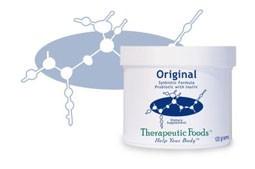
More than a probiotic!
Yes, we love our bugs! Friends, television ads, and even your physician have probably told you that probiotics are part of a healthy life. “Probiotics” is a fancy name for the friendly germs that live on our skin and in our digestive tract and enhance our digestion and our immune function. We acquire healthy bacteria as newborns and then add to the community over the course of our lives with our exposure to raw and fermented foods as well as germs normally present if we refrain from harsh anti-bacterial soaps and cleansers.
We need a healthy community of probiotics, but that isn't always easy to manage. The greatest assault to our internal probiotic community comes from antibiotics. When you take a course of antibiotics, your intestines take years to recover fully, if they ever do. Antibiotics, rightfully valued as death-defying miracle drugs, have become as commonplace as candy and even more hazardous. More than 100 million antibiotics prescriptions are written annually in the US, and it is estimated that more than 10% (or more than 10 million) are unnecessary. Necessary or unnecessary, if you've taken antibiotics, your probiotics needs some help. Additionally, all conventionally raised meat is a source of antibiotics affecting our food supply, groundwater, and ultimately ourselves.
How About a Synbiotic?
Here's the special information which you might not have heard before. We all might benefit from taking more than a simple probiotic. Particularly if you have ever taken antibiotics - more so if in the last three years - you stand to reap great rewards from taking not just a probiotic but a synbiotic. Curious?
A healthy digestion houses both prebiotics and probiotics. Think of prebiotics (indigestible fiber) as the structure on which the probiotics (friendly and helpful bacteria) like to live. A serious course of antibiotics (or a serious intestinal infection) can take out the structure as well as the good bugs. Not uncommonly, people feel belly upset after antibiotics even after they try to replace the probiotics they lost.
What can help is taking a synbiotic that combines the most effective dose of prebiotics with the most essential probiotics to return you to good health.
One I Recommend Highly
A premier probiotic is a real plus to anyone who's had antibiotics or digestive complaints. Not available in stores, DrDeborahMD's store is able to offer BioImmersion's Original Synbiotic Formula, a top choice for several reasons. BioImmersion applies advanced technologies to create a useful product at a reasonable price and for that alone it is a fantastic bargain. In addition, BioImmersion's Synbiotic comes as a powder. While capsules or pills are more convenient, a powder offers you greater flexibility.
It turns out that if you really need probiotics, you often can have some uncomfortable bloating when you start to take them. It's the bad guys fighting back as the good guys move in! So again, for those who've taken antibiotics, or those with gut problems, this product is ideal because you can start with 1/4 tsp (or less) once a day and slowly increase to a full dose, 1/2 Tbsp (= 1-1/2 tsp) daily.
BioImmersion chooses specific lactobacilli strains to protect, counteract, and neutralize specific and common dietary hazards, including aflatoxins (the carcinogenic mold that most notably grows on peanuts), cell mutagens from nitrosamines and heterocyclic amines, found in processed meats, and common food-borne pathogens. The probiotic inulin is not only a good home for the prebiotics, but also produces butyric acid, valuable for colon health.
I encourage you to consider the benefits of BioImmersion's Original Synbiotic and add it to your health program. Let me know your results!
